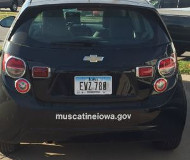5/2/2017
Iowa Cities Lose Appeal Over Speed Camera RulesJudge rules that the Iowa Department of Transportation has the authority to ban speed cameras from highways on safety grounds.

Cities in Iowa may no longer defy the state Department of Transportation's speed camera regulations under a ruling handed down last week. Polk County Judge Scott D. Rosenberg rejected the attempts by Cedar Rapids, Des Moines and Muscatine to avoid curbing their automated ticketing practices under rules adopted nearly four years ago.
The Iowa DOT did not ban the use of cameras. Instead, the agency set out principles for camera use that prioritized engineering solutions over revenue raising. State officials reviewed accident reports and only ordered the removal of cameras that were causing an increase in accidents or that were, for example, clearly designed to trick motorists by being placed next to a speed limit change. The rules affected a third of the state's cameras, but Cedar Rapids, Des Moines and Muscatine refused to comply. Gatso, the Dutch company in charge of the cameras, kept on issuing tickets on Interstates 235 and 380.
The cities insist that they can do what they want because they have home rule authority, but Iowa DOT pointed out that the state, not local governments, are responsible for traffic safety on interstates highways. The court agreed with this assessment.
"Based on state law providing the IDOT with the authority to regulate safety on primary highways, the Iowa legislature has provided the IDOT with the authority to regulate automated traffic enforcement camera systems placed on primary highways," Judge Rosenberg wrote. "The IDOT has the power to apply safety regulations to automated traffic enforcement camera systems use on primary highways, which does not interfere with municipal police officers' ability to enforce speed regulations."
The court was not persuaded that removing cameras would create a safety hazard.
"It is possible that automated traffic enforcement camera systems will result in unfamiliar drivers braking too quickly or frequently, causing greater risk for accidents," Judge Rosenberg wrote.
Cedar Rapids spent most of its lobbying effort citing the importance of "slowing down" drivers on the Interstate 380 S-curve, but the court pointed out that while enforcement of traffic headed into the curve might be reasonable, the camera is placed after the "tricky" section of the road where accelerating back up to speed is "normal and reasonable." The court also deferred to the Iowa DOT in rejecting evidence from the Insurance Institute for Highway Safety (IIHS), an organization that profits from speed camera use.
A copy of the ruling is available in a 170k PDF file at the source link below.


